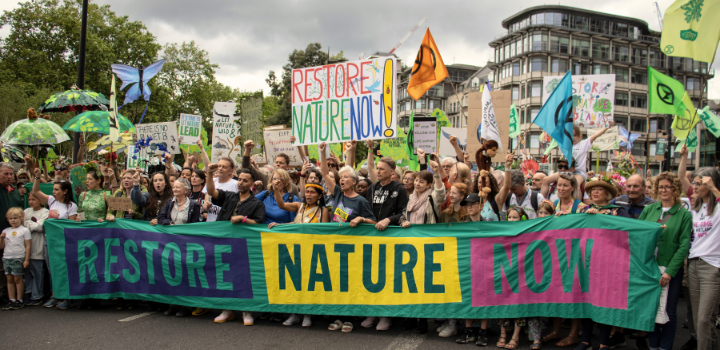This post is by Citizen Zoo
It was an experience unlike any other. The atmosphere was electric, as over 350 organisations and a reported 80,000 people marched through the streets of London on 22 June, demanding action to Restore Nature Now.
Arriving in Parliament Square, activists were met with a series of impassioned speeches and songs highlighting our collective failure to protect nature. As if echoing the urgency of the cause, three peregrines soared above, eventually perching on the spires of the Houses of Parliament. This incredible yet surreal sight seemed to signify that even these magnificent birds were imploring the government to address the nature and environmental crisis with the seriousness and urgency it demands.
The timing could not have been more critical. Never before had so many people marched together to protest the lack of action that has left the UK among the most nature-depleted countries on the planet, in the midst of a global mass extinction..
There are promising commitments but little actionOn paper, there is a backdrop of promising commitments to facilitate the restoration of nature, including the ‘30 by 30’ pledge, in which the government has committed to protect 30 per cent of land and sea in the UK for nature’s recovery and halt the decline of species by 2030. However, a report by Wildlife and Countryside Link has revealed that only 3.22 per cent of the land and eight per cent of the sea are well protected and managed. Additionally, the 2023 State of nature report shows that one in six species in Britain is threatened with extinction.
Like many, we at Citizen Zoo hoped that the environmental emergency and nature crisis would take a more prominent place in the political discourse leading up to the general election. In the various public debates and media coverage, these issues have been seldom mentioned. Even on the day of the march, the BBC failed to cover the tens of thousands of people demanding greater respect for our planet, more interested in the latest government scandal. There was one notable political debate dedicated to the ecological emergency, hosted by Chester Zoo and the Wildlife Trusts, but it only attracted relatively junior politicians, with no party leaders wholeheartedly engaging in the discussion.
Reviewing the various parties’ manifestos offers little comfort. There are some positive commitments, such as the Liberal Democrats’ aspiration to create new and restore existing National Parks and Labour’s ‘community right to buy’ for nature spaces. But none of the parties are making the comprehensive commitments needed to achieve the systemic change required. Integrating nature and the environment into economic and social policy, recognising their inherent and fundamental role in a healthy society, remains an unfulfilled necessity.
With political will real progress is madeHowever, despite these challenges, there have been instances in recent years where cross party political will has catalysed ecological restoration, demonstrating that, when politicians truly listen, doors can quickly open and change can happen at a reassuring pace. For example, Michael Gove’s tenure as secretary of state for environment, food and rural affairs between 2017 and 2019 is generally regarded as a positive time, during which leading conservationists, such as the Roy Dennis Foundation, were empowered to pursue long awaited projects like the reintroduction of the white-tailed eagle to southern England. This period also saw significant progress in the return of beavers to England.
Citizen Zoo, which focuses on urban rewilding and community empowerment, has seen significant progress since the Glasgow COP26 climate conference. London’s mayor Sadiq Khan has been a key figure in championing rewilding within London. He established the London Rewilding Taskforce, in which Citizen Zoo participates, and created the Rewild London Fund, from which we have gratefully received support multiple times for our work on water voles, beavers and large rewilding areas, such as Tolworth Court Farm. Sadiq Khan even joined in to release beavers as part of the Ealing Beaver Project. He has since been a vocal advocate for nature restoration in London and has championed a greater role for urban beavers.
We need political stabilityBut political instability has significantly disrupted progress, with ten different environment ministers in the last government, each serving an average tenure of less than two years. This has been compounded by wavering political support. For instance, on the day Citizen Zoo released beavers into Ealing in 2023, Thérèse Coffey, then environment minister, stated that species reintroductions were “not a priority”. To disregard such an important conservation technique which, when well done, can greatly benefit ecological restoration, is disappointing to say the least. This attitude reflects the significant regression in political interest in recent years, typically prioritising short term gains over the long term interventions essential for nature recovery.
Whatever the outcome of the looming general election, we hope that we are entering a period of political stability where our politicians give nature recovery the serious attention it desperately requires. Conservation organisations possesses the knowledge and techniques to restore nature, whether through large scale rewilding, regenerative farming or integrating nature into urban settings.
We just need our political leaders to give it the ‘green’ light. Doing so can bring the far reaching and multidimensional benefits needed for a healthy society and a sustainable future. Let’s hope there won’t be a need again for thousands to march through the streets of London to push for a proactive approach. If we have to, we imagine parliament’s peregrines will join us again in our plea for change.
Image from Steve Eason on Flickr
Discover more from Inside track
Subscribe to get the latest posts sent to your email.
